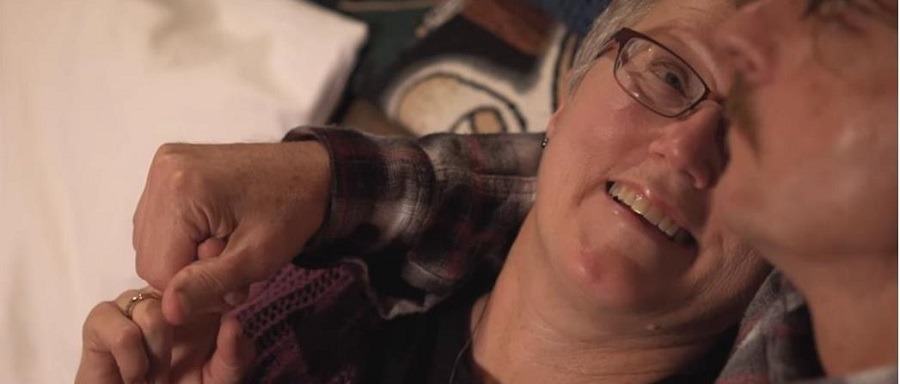Karen’s Tips when Caring for a Loved One with Alzheimer’s

As many empty nesters reach their late 50s, they start to plan for retirement and look forward to a new stage of life as a couple. But for Karen and Jack Gillespie, their future took a very different path. Nine years ago, at only 54-years-old, Jack was diagnosed with early-onset Alzheimer’s Disease. What started with memory loss and mood changes, Alzheimer’s has now left Jack non-verbal, unable to care for himself and with grand mal seizures. Karen, his wife of almost 35 years, provides Jack around-the-clock care.
In 2017, Karen’s loving and patient support was recognized by VHA’s Heart of Home Care Awards. Jack and Karen were also recently featured in the CBC documentary The Caregivers’ Club following three families as they navigate dementia.
Karen knows the frustration and heartbreak that comes with this disease, and to recognize Alzheimer’s Awareness Month, she has offered some tips from her own experiences. If you are caring for a loved one with Alzheimer’s, Karen suggests:
1. Be patient.
“I’ve noticed how much my outlook and actions affect my husband,” says Karen. She always tries to put herself in Jack’s shoes and has learned to redirect instead of correcting difficult behaviours. “Change the topic and don’t take things personally. They don’t mean or want to hurt you,” says Karen. She also suggests to keep things light and laugh as much as you can. “When Jack laughs, the whole house laughs,” she says.
2. Stay flexible.
“To make it all work you need to learn to be flexible and willing to change. What’s working this week, may not work in two weeks. Try it again, a different day and in a different way,” says Karen. For nearly every difficulty Karen believes there’s usually a solution, you just have to find it. “There are utensils to help with eating, cups with nose cut-outs, clocks that display the day of the week and adaptive clothing.” Don’t accept the status quo, be creative and find solutions. Karen suggests looking for used equipment and making your own adaptations to cut costs.
3. Get organized.
Caregiving doesn’t leave you with a lot of extra time. Karen encourages buying a binder with separate sections to keep business cards, medication lists, reminders and pamphlets all in one place. “You’ll save so much time not having to search for the information you need,” says Karen. She also advises that you keep a note on the fridge that lists medication and doses, health card number and any allergies so in an emergency you don’t have to pull this together in a panic.
4. Don’t make promises you can’t keep.
Karen believes that so many caregivers make the mistake of promising they will never put their loved one in a long-term care facility. Instead, tell them that, “you will always do your best to care for them,” says Karen. “Don’t make impossible promises and keep your options open or you’ll end up feeling guilty and like you’ve failed. Really, you’re doing your very best.”
5. Ask for and accept help.
“Reach out to family, friends, neighbours and volunteers to create your care team. People want to help, they just don’t know how,” says Karen. She suggests making a list so you’re ready when people ask. “Even getting milk, shoveling my driveway, or mailing a letter is so helpful when I can’t get out of the house,” notes Karen. Old friends may need some coaching on how to continue a friendship through Alzheimer’s. “While Jack doesn’t speak, you can read him the newspaper, listen to music together or watch a hockey game,” says Karen. She also encourages visiting your local Alzheimer’s society, joining online support groups and seeing a therapist to help manage the grief that comes with this illness.
6. Take care of yourself.
As Jack’s disease has progressed, it has become harder for Karen to get time to herself. She’s found ways to appreciate the little things around her. Listening to the birds, looking up at the night sky, bringing in fresh flowers from the garden, trying new types of tea, watching funny internet videos and working on new hobbies have all helped her cope. Karen also started a “To Do Someday” jar where she collects little reasonable, inexpensive activities she wants to try. Karen plans to visit local microbreweries, pull out her walking poles and buy an unexpected nail polish colour. She reminds us that, “you can get caught up feeling mad and sorry for yourself, but you are responsible for your own happiness. Try not to get too down and smile. Smile a lot”
When Karen talks about Jack it’s so clear how much she loves him. “I always knew I was in this for the long haul. I love my husband dearly. He’s my soul mate,” she says. Karen’s perspective, outlook, patience and love for her family are an inspiration for us all.
Below is Karen and Jack’s Heart of Home Care Awards video:
